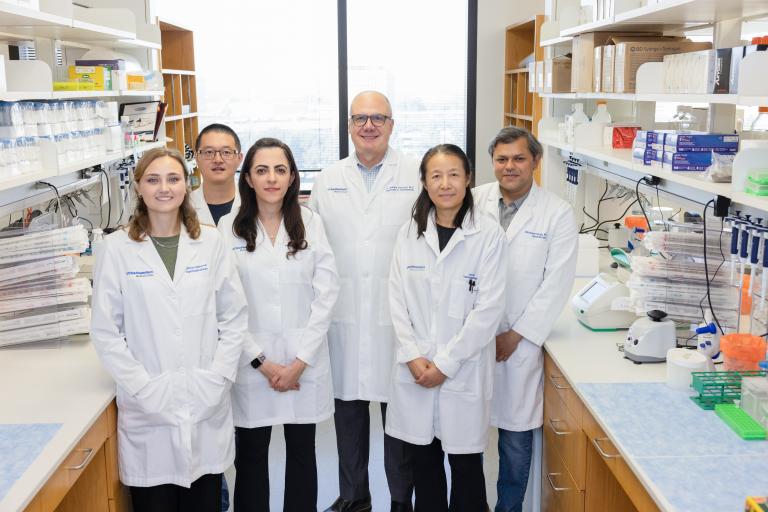Harbour Lab
The Harbour Lab uses genomic technologies and genetically engineered human cells and mouse models to develop biomarkers and elucidate mechanisms of tumor evolution and metastasis in uveal melanoma and retinoblastoma.

Dr. Harbour is Professor and Chair of the Department of Ophthalmology at UT Southwestern Medical Center. He specializes in ocular oncology.
Dr. Harbour earned his medical degree at Johns Hopkins University and completed a residency in ophthalmology at the Wills Eye Hospital of Thomas Jefferson University. He received advanced training through a fellowship in vitreoretinal diseases and surgery at the Bascom Palmer Eye Institute of the University of Miami, a fellowship in ocular oncology at the University of California, San Francisco, and research training in molecular oncology at Washington University in St. Louis.
Certified by the American Board of Ophthalmology, he joined the UT Southwestern faculty in 2021.
Previously, Dr. Harbour held the Dr. Mark J. Daily, M.D., Endowed Chair at the Bascom Palmer Eye Institute, where he also served as Director of Ocular Oncology and Vice Chair for Translational Research. He also served as Associate Director for Basic Science at the Sylvester Comprehensive Cancer Center of the University of Miami.
Dr. Harbour’s clinical interests focus on ocular tumors such as uveal melanoma, retinoblastoma, and lymphoma. He has trained many residents and fellows and pioneered new surgical methods in fine needle biopsy, laser treatment, and brachytherapy of ocular tumors. He also has been awarded patents for innovations in genetic prognostic testing for uveal melanoma.
His research interests include the use of genetic and genomic technologies to better understand, diagnose, and treat eye cancers. His team discovered three of the most important genomic drivers of metastasis in uveal melanoma, as well as key genomic events in retinoblastoma. His contributions to the field have been recognized by the Association for Research in Vision and Ophthalmology’s Cogan Award and the Macula Society’s Paul Henkind and Rosenthal Awards, among many others.
Dr. Harbour has delivered more than 300 invited scientific lectures and published more than 200 peer-reviewed scientific articles and book chapters.
He is an Associate Editor for Melanoma Research and has served on the editorial boards of Archives of Ophthalmology, Translational Vision Science & Technology, Melanoma Management, Expert Review of Ophthalmology, and Faculty of 1000.
Dr. Harbour is a member of numerous professional organizations, including the Association of American Physicians, American Academy of Ophthalmology, American Association for Cancer Research, and American Association of Ophthalmic Oncologists and Pathologists, and he is the founder of the Collaborative Ocular Oncology Group.

L. to r.: Olivia Osborne, B.S. (Research Assistant II); Xiao Liu, Ph.D. (Computational Biologist II); Mahsa Sorouri, Ph.D. (Instructor and Lab Manager); J. William Harbour, M.D. (Principal Investigator); Jie Han, M.S. (Sr. Research Scientist); and Mithalesh Singh, Ph.D. (Postdoc)
Ph.D. in Biomedical Sciences
(Baylor University)
M.S. in Biotechnology
(Johns Hopkins University)
B.S. in Biotechnology
(University of Nebraska at Omaha)

M.S. in Computer Science and Engineering
(UT Arlington)
Bachelor of Medicine
(Shanghai Medical University, now known as Fu Dan University in China)

Ph.D. in Ocular Oncology and Pathology
(All India Institute of Medical Sciences, New Delhi, India)
M.S. in Life Sciences
(Indira Gandhi National Open University, New Delhi, India)
B.S. in Zoology
(University of New Delhi, India)

Ph.D. in Molecular and Cellular Biology
(Ohio University)
M.S. in Computer Science
(Ohio University)
B.S. in Biotechnology
(Harbin Institute of Technology, China)

B.S. in Biochemistry
(UT Dallas)

Over the past two decades, the Harbour Laboratory has made great strides in understanding uveal melanoma, the most common primary cancer of the eye. The lab found that uveal melanomas can be divided into two basic forms, based on gene expression profile, mutation status, and chromosomal alterations. Class 1 uveal melanomas have low metastatic risk, whereas class 2 uveal melanomas have high metastatic risk. Based on this discovery, the lab developed a clinical prognostic test based on a 15-gene signature that has been prospectively validated in multiple studies and is currently the standard of care for precision medicine in this cancer type. Further, the lab discovered that mutational inactivation of the tumor suppressor BAP1 accounts for the class 2 uveal melanoma tumor type, as well as a novel BAP1 familial cancer syndrome, which is transmitted in an autosomal dominant fashion and can include uveal and cutaneous melanoma, mesothelioma, renal cell carcinoma, meningioma, and other cancer types.
Recently, the lab discovered that the cancer-testis antigen PRAME can be aberrantly expressed in uveal melanoma, representing an independent prognostic factor in both class 1 and class 2 uveal melanomas. Further work in the lab has disclosed a functional role for PRAME in chromosomal instability, aneuploidy, and tumor progression.
The Harbour Laboratory has established tumor samples and cell lines from a large number of primary human retinoblastoma samples and has undertaken an unprecedented scope and depth of genomic analysis that has disclosed a new understanding of retinoblastoma progression. The lab discovered ESRRG as one of the key drivers of retinoblastoma progression. This estrogen-related orphan receptor plays an essential role in retinal development, hypoxic adaptation, and retinoblastoma progression.
Major research directions in the lab include:
Identification of targetable epigenetic vulnerabilities for uveal melanoma
Yenisehirli G, Borges S, Braun SS, Zuniga AN, Quintana GI, Kutsnetsoff JN, Volonterio RL, Rodriguez S, Adis EV, Lopez S, Dollar JJ, Stathias V, Volmar CH, Karaca E, Brothers SP, Bilbao D, Harbour JW, Correa ZM, Kurtenbach S 2026 Dec Cell Death and Disease 17Assessment of Sensorimotor Complications After Plaque Brachytherapy for Patients With Uveal Melanoma
Munkwitz SE, Shields C, Nicola MD, Williams BK, Correa ZM, Harbour JW, Cavuoto KM, Falcone MM 2026 Jan American journal of ophthalmology 281 624-630Anterior chamber metastasis from adenocarcinoma of the uterine cervix
Harbour JW, Corrêa ZM 2025 Arquivos Brasileiros de Oftalmologia 88Do Short Delays in Treatment Affect Uveal Melanoma Prognosis?
Harbour JW, Correa ZM, Stacey AW 2024 Sep Ophthalmology 131 1105-1106Vitreous metastasis from cutaneous melanoma: diagnosis and management
Ashkenazy N, Harbour JW, Dubovy SR, Albini TA, Sridhar J, Patel N, Hansen ED, Uchiyama E, Rubsamen PE, Correa ZM 2024 Arquivos Brasileiros de Oftalmologia 87IRIS METASTASIS from BREAST CANCER SUCCESSFULLY TREATED with ABEMACICLIB and LETROZOLE
Goduni L, Ashkenazy N, Hansen E, Soyano-Muller A, Correa ZM, Harbour JW 2023 Mar Retinal Cases and Brief Reports 17 123-125Post-Radiation Cataract Management: Outcomes in Individuals with Uveal Melanoma
Sepulveda-Beltran PA, Levine H, Gibbons AG, Maharaj A, Choi DS, Martinez JD, Correa ZM, Amescua G, Harbour JW 2022 Dec Current Ophthalmology Reports 10 218-227HDAC11 activity contributes to MEK inhibitor escape in uveal melanoma
Sriramareddy SN, Faião-Flores F, Emmons MF, Saha B, Chellappan S, Wyatt C, Smalley I, Licht JD, Durante MA, Harbour JW, Smalley KS 2022 Dec Cancer Gene Therapy 29 1840-1846Adjuvant crizotinib in high-risk uveal melanoma following definitive therapy
Khan S, Lutzky J, Shoushtari AN, Jeter J, Marr B, Olencki TE, Cebulla CM, Abdel-Rahman M, Harbour JW, Sender N, Nesson A, Singh-Kandah S, Hernandez S, King J, Katari MS, Dimapanat L, Izard S, Ambrosini G, Surriga O, Rai AJ, Chiuzan C, Schwartz GK, Carvajal RD 2022 Aug Frontiers in Oncology 12Pyruvate dehydrogenase inactivation causes glycolytic phenotype in BAP1 mutant uveal melanoma
Han A, Chua V, Baqai U, Purwin TJ, Bechtel N, Hunter E, Tiago M, Seifert E, Speicher DW, Schug ZT, Harbour JW, Aplin AE 2022 Feb Oncogene 41 1129-1139Functional impact of titin (TTN) mutations in ocular surface squamous neoplasia
Djulbegovic MB, Uversky VN, Karp CL, Harbour JW 2022 Jan International Journal of Biological Macromolecules 195 93-101Secondary Glaucoma Associated with Intraocular Metastatic Cutaneous Melanoma
Greenfield JA, Rowlands M, Harbour JW 2022 Jan Ophthalmology Glaucoma 5 119-120The AMP-dependent kinase pathway is upregulated in BAP1 mutant uveal melanoma
Chua V, Han A, Bechtel N, Purwin TJ, Hunter E, Liao C, Harbour JW, Aplin AE 2022 Jan Pigment Cell and Melanoma Research 35 78-87Analytical Validation and Performance of a 7-Gene Next-Generation Sequencing Panel in Uveal Melanoma
Alsina KM, Sholl LM, Covington KR, Arnal SM, Durante MA, Decatur CL, Stone JF, Oelschlager KM, Harbour JW, Monzon FA, Cook RW, Borman S 2021 Dec Ocular Oncology and Pathology 7 428-436Multiregional genetic evolution of metastatic uveal melanoma
Rodriguez DA, Yang J, Durante MA, Shoushtari AN, Moschos SJ, Wrzeszczynski KO, Harbour JW, Carvajal RD 2021 Dec npj Genomic Medicine 6Uphyloplot2: visualizing phylogenetic trees from single-cell RNA-seq data
Kurtenbach S, Cruz AM, Rodriguez DA, Durante MA, Harbour JW 2021 Dec BMC Genomics 22Comprehensive assessment of the effect of eye plaque tilt on tumor dosimetry
Studenski MT, Markoe A, Samuels SE, Correa ZM, Bossart E, Harbour JW 2021 Nov Brachytherapy 20 1289-1295Structural protein analysis of driver gene mutations in conjunctival melanoma
Djulbegovic MB, Uversky VN, Harbour JW, Galor A, Karp CL 2021 Oct Genes 12Kinetic characterization of ASXL1/2-mediated allosteric regulation of the BAP1 deubiquitinase
Peng H, Cassel J, McCracken DS, Prokop JW, Sementino E, Cheung M, Collop PR, Polo A, Joshi S, Mandell JP, Ayyanathan K, Hinds D, Malkowicz SB, Harbour JW, Bowcock AM, Salvino J, Kennedy EJ, Testa JR, Rauscher FJ 2021 Jul Molecular Cancer Research 19 1099-1112Multimodal Imaging in the Diagnosis of Exophytic Juxtapapillary Retinal Capillary Hemangioblastoma
Russell JF, Villegas VM, Schwartz SG, Weng CY, Davis JL, Flynn HW, Harbour JW 2021 May American journal of ophthalmology 225 128-136PieParty: visualizing cells from scRNA-seq data as pie charts
Kurtenbach S, Dollar JJ, Cruz AM, Durante MA, Decatur CL, Harbour JW 2021 May Life Science Alliance 4Molecular Basis of Uveal Melanoma and Emerging Therapeutic Targets
Harbour JW, Correa ZM 2021 Jan 3-12A novel cardiomyogenic role for Isl1+ neural crest cells in the inflow tract
Hatzistergos KE, Durante MA, Valasaki K, Wanschel AC, William Harbour J, Hare JM 2020 Dec Science Advances 6Single-cell analysis reveals new evolutionary complexity in uveal melanoma
Durante MA, Rodriguez DA, Kurtenbach S, Kuznetsov JN, Sanchez MI, Decatur CL, Snyder H, Feun LG, Livingstone AS, Harbour JW 2020 Dec Nature communications 11Impact of genetic ancestry on prognostic biomarkers in uveal melanoma
Rodriguez DA, Sanchez MI, Decatur CL, Correa ZM, Martin ER, Harbour JW 2020 Nov Cancers 12 1-13Bilateral uveitis associated with nivolumab therapy for metastatic non-small cell lung cancer
Dermarkarian CR, Patel NA, Villegas VM, Harbour JW 2020 Jun American Journal of Ophthalmology Case Reports 18Decitabine limits escape from MEK inhibition in uveal melanoma
Gonçalves J, Emmons MF, Faião-Flores F, Aplin AE, Harbour JW, Licht JD, Wink MR, Smalley KS 2020 May Pigment Cell and Melanoma Research 33 507-514Global Retinoblastoma Presentation and Analysis by National Income Level
Fabian ID, Abdallah E, Abdullahi SU, Abdulqader RA, Adamou Boubacar S, Ademola-Popoola DS, Adio A, Afshar AR, Aggarwal P, Aghaji AE, Ahmad A, Akib MN, Al Harby L, Al Ani MH, Alakbarova A, Portabella SA, Al-Badri SA, Alcasabas AP, Al-Dahmash SA, Alejos A, Alemany-Rubio E, Alfa Bio AI, Alfonso Carreras Y, Al-Haddad C, Al-Hussaini HH, Ali AM, Alia DB, Al-Jadiry MF, Al-Jumaly U, Alkatan HM, All-Eriksson C, Al-Mafrachi AA, Almeida AA, Alsawidi KM, Al-Shaheen AA, Al-Shammary EH, Amiruddin PO, Antonino R, Astbury NJ, Atalay HT, Atchaneeyasakul LO, Atsiaya R, Attaseth T, Aung TH, Ayala S, Baizakova B, Balaguer J, Balayeva R, Balwierz W, Barranco H, Bascaran C, Beck Popovic M, Benavides R, Benmiloud S, Bennani Guebessi N, Berete RC, Berry JL, Bhaduri A, Bhat S, Biddulph SJ, Biewald EM, Bobrova N, Boehme M, Boldt HC, Bonanomi MT, Bornfeld N, Bouda GC, Bouguila H, Boumedane A, Brennan RC, Brichard BG, Buaboonnam J, Calderón-Sotelo P, Calle Jara DA, Camuglia JE, Cano MR, Capra M, Cassoux N, Castela G, Castillo L, Català-Mora J, Chantada GL, Chaudhry S, Chaugule SS, Chauhan A, Chawla B, Chernodrinska VS, Chiwanga FS, Chuluunbat T, Cieslik K, Cockcroft RL, Comsa C, Correa ZM, Correa Llano MG, Corson TW, Cowan-Lyn KE, Csóka M, Cui X, Da Gama IV, Dangboon W, Das A, Das S, Davanzo JM, Davidson A, De Potter P, Delgado KQ, Demirci H, Desjardins L, Diaz Coronado RY, Dimaras H, Dodgshun AJ, Donaldson C, Donato Macedo CR, Dragomir MD, Du Y, Du Bruyn M, Edison KS, Eka Sutyawan IW, El Kettani A, Elbahi AM, Elder JE, Elgalaly D, Elhaddad AM, Elhassan MM, Elzembely MM, Essuman VA, Evina TG, Fadoo Z, Fandiño AC, Faranoush M, Fasina O, Fernández DD, Fernández-Teijeiro A, Foster A, Frenkel S, Fu LD, Fuentes-Alabi SL, Gallie BL, Gandiwa M, Garcia JL, García Aldana D, Gassant PY, Geel JA, Ghassemi F, Girón AV, Gizachew Z, Goenz MA, Gold AS, Goldberg-Lavid M, Gole GA, Gomel N, Gonzalez E, Gonzalez Perez G, González-Rodríguez L, Garcia Pacheco HN, Graells J, Green L, Gregersen PA, Grigorovski ND, Guedenon KM, Gunasekera DS, Gündüz AK, Gupta H, Gupta S, Hadjistilianou T, Hamel P, Hamid SA, Hamzah N, Hansen ED, Harbour JW, Hartnett ME, Hasanreisoglu M, Hassan S, Hassan S, Hederova S, Hernandez J, Hernandez LM, Hessissen L, Hordofa DF, Huang LC, Hubbard GB, Hummlen M, Husakova K, Hussein Al-Janabi AN, Ida R, Ilic VR, Jairaj V, Jeeva I, Jenkinson H, Ji X, Jo DH, Johnson KP, Johnson WJ, Jones MM, Kabesha TB, Kabore RL, Kaliki S, Kalinaki A, Kantar M, Kao LY, Kardava T, Kebudi R, Kepak T, Keren-Froim N, Khan ZJ, Khaqan HA, Khauv P, Kheir WJ, Khetan V, Khodabande A, Khotenashvili Z, Kim JW, Kim JH, Kiratli H, Kivelä TT, Klett A, Komba Palet JE, Krivaitiene D, Kruger M, Kulvichit K, Kuntorini MW, Kyara A, Lachmann ES, Lam CP, Lam GC, Larson SA, Latinović S, Laurenti KD, Le BH, Lecuona K, Leverant AA, Li C, Limbu B, Long QB, López JP, Lukamba RM, Lumbroso L, Luna-Fineman S, Lutfi D, Lysytsia L, Magrath GN, Mahajan A, Majeed AR, Maka E, Makan M, Makimbetov EK, Manda C, Martín Begue N, Mason L, Mason JO, Matende IO, Materin M, Mattosinho CC, Matua M, Mayet I, Mbumba FB, McKenzie JD, Medina-Sanson A, Mehrvar A, Mengesha AA, Menon V, Mercado GJ, Mets MB, Midena E, Mishra DK, Mndeme FG, Mohamedani AA, Mohammad MT, Moll AC, Montero MM, Morales RA, Moreira C, Mruthyunjaya P, Msina MS, Msukwa G, Mudaliar SS, Muma KI, Munier FL, Murgoi G, Murray TG, Musa KO, Mushtaq A, Mustak H, Muyen OM, Naidu G, Nair AG, Naumenko L, Ndoye Roth PA, Nency YM, Neroev V, Ngo H, Nieves RM, Nikitovic M, Nkanga ED, Nkumbe H, Nuruddin M, Nyaywa M, Obono-Obiang G, Oguego NC, Olechowski A, Oliver SC, Osei-Bonsu P, Ossandon D, Paez-Escamilla MA, Pagarra H, Painter SL, Paintsil V, Paiva L, Pal BP, Palanivelu MS, Papyan R, Parrozzani R, Parulekar M, Pascual Morales CR, Paton KE, Pawinska-Wasikowska K, Pe'Er J, Peña A, Perić S, Pham CT, Philbert R, Plager DA, Pochop P, Polania RA, Polyakov VG, Pompe MT, Pons JJ, Prat D, Prom V, Purwanto I, Qadir AO, Qayyum S, Qian J, Rahman A, Rahman S, Rahmat J, Rajkarnikar P, Ramanjulu R, Ramasubramanian A, Ramirez-Ortiz MA, Raobela L, Rashid R, Reddy MA, Reich E, Renner LA, Reynders D, Ribadu D, Riheia MM, Ritter-Sovinz P, Rojanaporn D, Romero L, Roy SR, Saab RH, Saakyan S, Sabhan AH, Sagoo MS, Said AM, Saiju R, Salas B, San Román Pacheco S, Sánchez GL, Sayalith P, Scanlan TA, Schefler AC, Schoeman J, Sedaghat A, Seregard S, Seth R, Shah AS, Shakoor SA, Sharma MK, Sherief ST, Shetye NG, Shields CL, Siddiqui SN, Sidi Cheikh S, Silva S, Singh AD, Singh N, Singh U, Singha P, Sitorus RS, Skalet AH, Soebagjo HD, Sorochynska T, Ssali G, Stacey AW, Staffieri SE, Stahl ED, Stathopoulos C, Stirn Kranjc B, Stones DK, Strahlendorf C, Suarez ME, Sultana S, Sun X, Sundy M, Superstein R, Supriyadi E, Surukrattanaskul S, Suzuki S, Svojgr K, Sylla F, Tamamyan G, Tan D, Tandili A, Tarrillo Leiva FF, Tashvighi M, Tateshi B, Tehuteru ES, Teixeira LF, Teh KH, Theophile T, Toledano H, Trang DL, Traoré F, Trichaiyaporn S, Tuncer S, Tyau-Tyau H, Umar AB, Unal E, Uner OE, Urbak SF, Ushakova TL, Usmanov RH, Valeina S, Van Hoefen Wijsard M, Varadisai A, Vasquez L, Vaughan LO, Veleva-Krasteva NV, Verma N, Victor AA, Viksnins M, Villacís Chafla EG, Vishnevskia-Dai V, Vora T, Wachtel AE, Wackernagel W, Waddell K, Wade PD, Wali AH, Wang YZ, Weiss A, Wilson MW, Wime AD, Wiwatwongwana A, Wiwatwongwana D, Wolley Dod C, Wongwai P, Xiang D, Xiao Y, Yam JC, Yang H, Yanga JM, Yaqub MA, Yarovaya VA, Yarovoy AA, Ye H, Yousef YA, Yuliawati P, Zapata López AM, Zein E, Zhang C, Zhang Y, Zhao J, Zheng X, Zhilyaeva K, Zia N, Ziko OA, Zondervan M, Bowman R 2020 May JAMA Oncology 6 685-695Single-cell analysis of olfactory neurogenesis and differentiation in adult humans
Durante MA, Kurtenbach S, Sargi ZB, Harbour JW, Choi R, Kurtenbach S, Goss GM, Matsunami H, Goldstein BJ 2020 Mar Nature neuroscience 23 323-326Influence of tumor shape and location in eye plaque brachytherapy dosimetry
Studenski MT, Patel NV, Markoe A, Harbour JW, Samuels SE 2020 Mar Brachytherapy 19 249-254Biological mechanisms and clinical signifi cance of BAP1 mutations in human cancer
Carbone M, Harbour JW, Brugarolas J, Bononi A, Pagano I, Dey A, Krausz T, Pass HI, Yang H, Gaudino G 2020 Cancer discovery 10 1103-1120Vitreoretinal lymphoma followed by systemic diffuse large B cell lymphoma
Fan KC, Tran KD, Harbour JW, Dubovy SA, Patel NA, Albini TA 2019 Dec Journal of Ophthalmic Inflammation and Infection 9HDAC inhibition enhances the in vivo efficacy of MEK inhibitor therapy in uveal melanoma
Faião-Flores F, Emmons MF, Durante MA, Kinose F, Saha B, Fang B, Koomen JM, Chellappan SP, Maria-Engler SS, Rix U, Licht JD, Harbour JW, Smalley KS 2019 Sep Clinical Cancer Research 25 5686-5701Persistent fetal vasculature presenting with axial elongation and platyphakia
Lin J, Paez-Escamilla M, Teira LE, Fallas B, Harbour JW 2019 Feb Journal of AAPOS 23 51-53ChIPprimersDB: A public repository of verified qPCR primers for chromatin immunoprecipitation (ChIP)
Kurtenbach S, Reddy R, Harbour JW 2019 Jan Nucleic acids research 47 D46-D49Follow the nevus: The cost-utility of monitoring for growth of choroidal nevi
Barsam AS, Gibbons A, McClellan AJ, Harbour JW, Smiddy WE 2019 International Journal of Ophthalmology 12 1456-1464Genomic evolution of uveal melanoma arising in ocular melanocytosis
Durante MA, Field MG, Sanchez MI, Covington KR, Decatur CL, Dubovy SR, Harbour JW 2019 Cold Spring Harbor Molecular Case Studies 5An eight-year-old girl presents with two weeks of vision loss and nightly headaches
Scott NL, Tran KD, Cernichiaro-Espinosa LA, Russell JF, Hinkle JW, Harbour JW, Dubovy SR, Berrocal AM 2019 Ophthalmic Surgery Lasers and Imaging Retina 50 314-317Punctuated evolution of canonical genomic aberrations in uveal melanoma
Field MG, Durante MA, Anbunathan H, Cai LZ, Decatur CL, Bowcock AM, Kurtenbach S, Harbour JW 2018 Dec Nature communications 9Comprehensive study of the clinical phenotype of germline BAP1 variant-carrying families worldwide
Walpole S, Pritchard AL, Cebulla CM, Pilarski R, Stautberg M, Davidorf FH, de la Fouchardière A, Cabaret O, Golmard L, Stoppa-Lyonnet D, Garfield E, Njauw CN, Cheung M, Turunen JA, Repo P, Järvinen RS, van Doorn R, Jager MJ, Luyten GP, Marinkovic M, Chau C, Potrony M, Höiom V, Helgadottir H, Pastorino L, Bruno W, Andreotti V, Dalmasso B, Ciccarese G, Queirolo P, Mastracci L, Wadt K, Kiilgaard JF, Speicher MR, van Poppelen N, Kilic E, Al-Jamal RT, Dianzani I, Betti M, Bergmann C, Santagata S, Dahiya S, Taibjee S, Burke J, Poplawski N, O’Shea SJ, Newton-Bishop J, Adlard J, Adams DJ, Lane AM, Kim I, Klebe S, Racher H, Harbour JW, Nickerson ML, Murali R, Palmer JM, Howlie M, Symmons J, Hamilton H, Warrier S, Glasson W, Johansson P, Robles-Espinoza CD, Ossio R, de Klein A, Puig S, Ghiorzo P, Nielsen M, Kivelä TT, Tsao H, Testa JR, Gerami P, Stern MH, Bressac-De Paillerets B, Abdel-Rahman MH, Hayward NK 2018 Dec Journal of the National Cancer Institute 110Drug and disease signature integration identifies synergistic combinations in glioblastoma
Stathias V, Jermakowicz AM, Maloof ME, Forlin M, Walters W, Suter RK, Durante MA, Williams SL, Harbour JW, Volmar CH, Lyons NJ, Wahlestedt C, Graham RM, Ivan ME, Komotar RJ, Sarkaria JN, Subramanian A, Golub TR, Schürer SC, Ayad NG 2018 Dec Nature communications 9Reduced BAP1 activity prevents ASXL1 truncation-driven myeloid malignancy in vivo
Guo Y, Yang H, Chen S, Zhang P, Li R, Nimer SD, Harbour JW, Xu M, Yang FC 2018 Aug Leukemia 32 1834-1837Gain of function of ASXL1 truncating protein in the pathogenesis of myeloid malignancies
Yang H, Kurtenbach S, Guo Y, Lohse I, Durante MA, Li J, Li Z, Al-Ali H, Li L, Chen Z, Field MG, Zhang P, Chen S, Yamamoto S, Li Z, Zhou Y, Nimer SD, William Harbour J, Wahlestedt C, Xu M, Yang FC 2018 Jan Blood 131 328-341Intracameral topotecan hydrochloride for anterior chamber seeding of retinoblastoma
Paez-Escamilla M, Bagheri N, Teira LE, Corrales-Medina FF, Harbour JW 2017 Dec JAMA Ophthalmology 135 1453-1455Molecular characteristics of conjunctival melanoma using whole-exome sequencing
Swaminathan SS, Field MG, Sant D, Wang G, Galor A, Dubovy SR, Harbour JW, Karp CL 2017 Dec JAMA Ophthalmology 135 1434-1437Multimodal imaging of astrocytic hamartomas associated with tuberous sclerosis
Schwartz SG, Harbour JW 2017 Sep Ophthalmic Surgery Lasers and Imaging Retina 48 756-758An international survey of classification and treatment choices for group D retinoblastoma
Scelfo C, Francis JH, Khetan V, Jenkins T, Marr B, Abramson DH, Shields CL, Pe’er J, Munier F, Berry J, Harbour JW, Yarovoy A, Lucena E, Murray TG, Bhagia P, Paysse E, Tuncer S, Chantada GL, Moll AC, Ushakova T, Plager DA, Ziyovuddin I, Leal CA, Materin MA, Ji XD, Cursino JW, Polania R, Kiratli H, All-Ericsson C, Kebudi R, Honavar SG, Vishnevskia-Dai V, Epelman S, Daniels AB, Ling JD, Traore F, Ramirez-Ortiz MA 2017 Jun International Journal of Ophthalmology 10 961-967PRAME as a potential target for immunotherapy in metastatic uveal melanoma
Gezgin G, Luk SJ, Cao J, Dogrusöz M, Van Der Steen DM, Hagedoorn RS, Krijgsman D, Van Der Velden PA, Field MG, Luyten GP, Szuhai K, Harbour JW, Jordanova ES, Heemskerk MH, Jager MJ 2017 Jun JAMA Ophthalmology 135 541-549Driver mutations in uveal melanoma associations with gene expression profile and patient outcomes
Decatur CL, Ong E, Garg N, Anbunathan H, Bowcock AM, Field MG, Harbour JW 2016 Jul JAMA Ophthalmology 134 728-733ARF6 Is an Actionable Node that Orchestrates Oncogenic GNAQ Signaling in Uveal Melanoma
Yoo JH, Shi DS, Grossmann AH, Sorensen LK, Tong ZZ, Mleynek TM, Rogers A, Zhu W, Richards JR, Winter JM, Zhu J, Dunn C, Bajji A, Shenderovich M, Mueller AL, Woodman SE, Harbour JW, Thomas KR, Odelberg SJ, Ostanin K, Li DY 2016 Jun Cancer Cell 29 889-904PRAME as an independent biomarker for metastasis in uveal melanoma
Field MG, Decatur CL, Kurtenbach S, Gezgin G, Van Der Velden PA, Jager MJ, Kozak KN, Harbour JW 2016 Mar Clinical Cancer Research 22 1234-1242Uveal and Conjunctival Melanoma: Close Together-but Only Distantly Related
Harbour JW 2016 Jan Oncology (Williston Park, N.Y.) 30 44, 48EMT-associated factors promote invasive properties of uveal melanoma cells
Asnaghi L, Gezgin G, Tripathy A, Handa JT, Merbs SL, van der Velden PA, Jager MJ, Harbour JW, Eberhart CG 2015 Aug Molecular Vision 21 919-929Serous macular detachment following a systemic corticosteroid injection
Weng CY, William Harbour J 2015 Apr JAMA Ophthalmology 133 473-474Gene expression profiling and regression rate of irradiated uveal melanomas
Rao RC, Khan M, Badiyan SN, Harbour JW 2015 Mar Ophthalmic Surgery Lasers and Imaging Retina 46 333-337Skewed expression of the genes encoding epigenetic modifiers in high-risk uveal melanoma
Herlihy N, Dogrusöz M, Van Essen TH, William Harbour J, Van Der Velden PA, Van Eggermond MC, Haasnoot GW, Van Den Elsen PJ, Jager MJ 2015 Investigative Ophthalmology and Visual Science 56 1447-1458Epigenetic reprogramming of melanoma cells by vitamin C treatment
Gustafson CB, Yang C, Dickson KM, Shao H, Van Booven D, Harbour JW, Liu ZJ, Wang G 2015 Clinical Epigenetics 7Prognostic parameters in uveal melanoma and their association with bap1 expression
Van Essen TH, Van Pelt S, Versluis M, Bronkhorst IH, Van Duinen SG, Marinkovic M, Kroes WG, Ruivenkamp CA, Shukla S, De Klein A, Kiliç E, Harbour JW, Luyten GP, Van Der Velden PA, Verdijk RM, Jager MJ 2014 Dec British Journal of Ophthalmology 98 1738-1743Combined PKC and MEK inhibition for treating metastatic uveal melanoma
Sagoo MS, Harbour JW, Stebbing J, Bowcock AM 2014 Sep Oncogene 33 4722-4723GNAQ/11 mutations in uveal melanoma: Is YAP the key to targeted therapy?
Field MG, Harbour JW 2014 Jun Cancer Cell 25 714-715A molecular revolution in uveal melanoma: Implications for patient care and targeted therapy
William Harbour J, Chao DL 2014 Jun Ophthalmology 121 1281-1288Recent developments in prognostic and predictive testing in uveal melanoma
Field MG, Harbour JW 2014 May Current Opinion in Ophthalmology 25 234-239Distinguishing torpedo maculopathy from similar lesions of the posterior segment
Villegas VM, Schwartz SG, Flynn HW, Capó H, Berrocal AM, Murray TG, Harbour JW 2014 Ophthalmic Surgery Lasers and Imaging Retina 45 222-226Retinoblastoma protein prevents enteric nervous system defects and intestinal pseudo-Obstruction
Fu M, Landreville S, Agapova OA, Wiley LA, Shoykhet M, Harbour JW, Heuckeroth RO 2013 Dec Journal of Clinical Investigation 123 5152-5164BAP1 deficiency causes loss of melanocytic cell identity in uveal melanoma
Matatall KA, Agapova OA, Onken MD, Worley LA, Bowcock AM, Harbour JW 2013 Aug BMC Cancer 13Erratum: Gene expression profiling versus TNM classification (Ophthalmology (2013) 120 (1109))
Harbour JW, Augsburger JJ, Char DH 2013 Jul Ophthalmology 120 e52-e53Patient-derived xenografts recapitulate molecular features of human uveal melanomas
Laurent C, Gentien D, Piperno-Neumann S, Némati F, Nicolas A, Tesson B, Desjardins L, Mariani P, Rapinat A, Sastre-Garau X, Couturier J, Hupé P, de Koning L, Dubois T, Roman-Roman S, Stern MH, Barillot E, Harbour JW, Saule S, Decaudin D 2013 Jun Molecular oncology 7 625-636Impaired cholesterol efflux in senescent macrophages promotes age-related macular degeneration
Sene A, Khan AA, Cox D, Nakamura RE, Santeford A, Kim BM, Sidhu R, Onken MD, Harbour JW, Hagbi-Levi S, Chowers I, Edwards PA, Baldan A, Parks JS, Ory DS, Apte RS 2013 Apr Cell Metabolism 17 549-561Molecular testing prognostic of low risk in epithelioid uveal melanoma in a child
Dimaras H, Parulekar MV, Kwok G, Simpson ER, Ali A, Halliday W, Shago M, Harbour JW, Héon E, Gallie BL, Chan HS 2013 Mar British Journal of Ophthalmology 97 323-326Recurrent mutations at codon 625 of the splicing factor SF3B1 in uveal melanoma
Harbour JW, Roberson ED, Anbunathan H, Onken MD, Worley LA, Bowcock AM 2013 Feb Nature genetics 45 133-135A role for Jag2 in promoting uveal melanoma dissemination and growth
Asnaghi L, Handa JT, Merbs SL, Harbour JW, Eberhart CG 2013 Jan Investigative Ophthalmology and Visual Science 54 295-306Genomic, prognostic, and cell-signaling advances in uveal melanoma
Harbour JW 2013 American Society of Clinical Oncology educational book / ASCO. American Society of Clinical Oncology. Meeting 388-391High throughput mass spectrometry-based mutation profiling of primary uveal melanoma
Daniels AB, Lee JE, MacConaill LE, Palescandolo E, Van Hummelen P, Adams SM, DeAngelis MM, Hahn WC, Gragoudas ES, William Harbour J, Garraway LA, Kim IK 2012 Oct Investigative Ophthalmology and Visual Science 53 6991-6996Uveal melanoma: Molecular pattern, clinical features, and radiation response
Chappell MC, Char DH, Cole TB, Harbour JW, Mishra K, Weinberg VK, Phillips TL 2012 Aug American journal of ophthalmology 154 227-332.e2The genetics of uveal melanoma: An emerging framework for targeted therapy
Harbour JW 2012 Mar Pigment Cell and Melanoma Research 25 171-181Notch signaling promotes growth and invasion in uveal melanoma
Asnaghi L, Ebrahimi KB, Schreck KC, Bar EE, Coonfield ML, Bell WR, Handa J, Merbs SL, Harbour JW, Eberhart CG 2012 Feb Clinical Cancer Research 18 654-665Histone deacetylase inhibitors induce growth arrest and differentiation in uveal melanoma
Landreville S, Agapova OA, Matatall KA, Kneass ZT, Onken MD, Lee RS, Bowcock AM, Harbour JW 2012 Jan Clinical Cancer Research 18 408-416ABCB1 identifies a subpopulation of uveal melanoma cells with high metastatic propensity
Landreville S, Agapova OA, Kneass ZT, Salesse C, William Harbour J 2011 Jun Pigment Cell and Melanoma Research 24 430-437Diagnostic testing and treatment choices in primary vitreoretinal lymphoma
Rajagopal R, Harbour JW 2011 Mar Retina 31 435-440Association between gene expression profile, proliferation and metastasis in uveal melanoma
Onken MD, Worley LA, Harbour JW 2010 Sep Current Eye Research 35 857-863Loss of Id2 potentiates the tumorigenic effect of Rb inactivation in a mouse model of retinoblastoma
Landreville S, Ma D, Wu J, Harbour JW 2010 May Current Eye Research 35 435-439A transformation in ocular oncology: From megacenter to multicenter
Harbour JW 2010 Mar Archives of Ophthalmology 128 367-368Id2 deficiency promotes metastasis in a mouse model of ocular cancer
Agapova OA, Person E, Harbour JW 2010 Feb Clinical and Experimental Metastasis 27 91-96Molecular Prognostic Testing and Individualized Patient Care in Uveal Melanoma
Harbour JW 2009 Dec American journal of ophthalmology 148 823-829.e1Integrative genomic analysis of aneuploidy in uveal melanoma
Ehlers JP, Worley L, Onken MD, Harbour JW 2008 Jan Clinical Cancer Research 14 115-122Hepatic arterial chemoembolization for management of metastatic melanoma
Sharma KV, Gould JE, Harbour JW, Linette GP, Pilgram TK, Dayani PN, Brown DB 2008 Jan American Journal of Roentgenology 190 99-104Tilting of radioactive plaques after initial accurate placement for treatment of uveal melanoma
Almony A, Breit S, Zhao H, Garcia-Ramirez J, Mansur DB, Harbour JW 2008 Jan Archives of Ophthalmology 126 65-70Correlation study of benign cytomorphology and final clinical diagnosis
Zhai J, Harbour JW, Smith ME, Dávila RM 2008 Acta Cytologica 52 196-200Treatment outcomes for primary intraocular lymphoma: Implications for external beam radiotherapy
Berenbom A, Davila RM, Lin HS, Harbour JW 2007 Sep Eye 21 1198-1201Molecular prognostic testing in uveal melanoma: Has it finally come of age?
Harbour JW 2007 Aug Archives of Ophthalmology 125 1122-1123Transcriptomic versus chromosomal prognostic markers and clinical outcome in uveal melanoma
Worley LA, Onken MD, Person E, Robirds D, Branson J, Char DH, Perry A, Harbour JW 2007 Mar Clinical Cancer Research 13 1466-1471Prognostic testing in uveal melanoma by transcriptomic profiling of fine needle biopsy specimens
Onken MD, Worley LA, Dávilla RM, Char DH, Harbour JW 2006 Nov Journal of Molecular Diagnostics 8 567-573Rb at the interface between cell cycle and apoptotic decisions
Delston RB, Harbour JW 2006 Nov Current molecular medicine 6 713-718Functional gene expression analysis uncovers phenotypic switch in aggressive uveal melanomas
Onken MD, Ehlers JP, Worley LA, Makita J, Yokota Y, Harbour JW 2006 May Cancer research 66 4602-4609Eye cancer: Unique insights into oncogenesis: The Cogan lecture
Harbour JW 2006 May Investigative Ophthalmology and Visual Science 47 1737-1745Lipid exudation following plaque radiotherapy for posterior uveal melanoma
Mills MD, Harbour JW 2006 Mar American journal of ophthalmology 141 594-595.e1DDEF1 is located in an amplified region of chromosome 8q and is overexpressed in uveal melanoma
Ehlers JP, Worley L, Onken MD, Harbour JW 2005 May Clinical Cancer Research 11 3609-3613Functional analysis of the p53 pathway in response to ionizing radiation in uveal melanoma
Sun Y, Tran BN, Worley LA, Delston RB, Harbour JW 2005 Investigative Ophthalmology and Visual Science 46 1561-1564Fine needle aspiration biopsy with adjunct immunohistochemistry in intraocular tumor management
Faulkner-Jones BE, Foster WJ, Harbour JW, Smith ME, Dávila RM 2005 Acta Cytologica 49 297-308Photodynamic therapy for choroidal metastasis from carcinoid tumor
Harbour JW 2004 Jun American journal of ophthalmology 137 1143-1145For whom the bell tolls: Susceptibility to common adult cancers in retinoblastoma survivors
Kay FJ, Harbour JW 2004 Mar Journal of the National Cancer Institute 96 342-343Association between posterior uveal melanoma and iris freckles, iris naevi, and choroidal naevi
Harbour JW, Brantley MA, Hollingsworth H, Gordon M 2004 Jan British Journal of Ophthalmology 88 36-38Association between choroidal pigmentation and posterior uveal melanoma in a white population
Harbour JW, Brantley MA, Hollingsworth H, Gordon M 2004 Jan British Journal of Ophthalmology 88 39-43Cytologic diagnosis of intraocular lymphoma in vitreous aspirates
Farkas T, Harbour JW, Dávila RM 2004 Acta Cytologica 48 487-491Transpupillary Thermotherapy versus Plaque Radiotherapy for Suspected Choroidal Melanomas
Harbour JW, Meredith TA, Thompson PA, Gordon ME 2003 Nov Ophthalmology 110 2207-2214Pars plana vitrectomy in eyes containing a treated posterior uveal melanoma
Foster WJ, Harbour JW, Holekamp NM, Shah GK, Thomas MA 2003 Sep American journal of ophthalmology 136 471-476Ocular melanoma: A review and the relationship to cutaneous melanoma
Hurst EA, Harbour JW, Cornelius LA 2003 Aug Archives of Dermatology 139 1067-1073Distinct mechanisms for regulating the tumor suppressor and antiapoptotic functions of Rb
Ma D, Zhou P, Harbour JW 2003 May Journal of Biological Chemistry 278 19358-19366Rate of resolution of exudative retinal detachment after plaque radiotherapy for uveal melanoma
Harbour JW, Ahmad S, El-Bash M 2002 Nov Archives of Ophthalmology 120 1463-1469Transducible peptide therapy for uveal melanoma and retinoblastoma
Harbour JW, Worley L, Ma D, Cohen M 2002 Oct Archives of Ophthalmology 120 1341-1346Altered expression of Rb and p53 in uveal melanomas following plaque radiotherapy
Brantley MA, Worley L, Harbour JW 2002 American journal of ophthalmology 133 242-248Regulation of retinoblastoma protein activity by the c terminal domain
Harbour JW, Luo RX 1997 Investigative Ophthalmology and Visual Science 38 S384Langerhans cell histiocytosis diagnosed by fine needle biopsy
Harbour JW, Char DH, Ljung BM, Luna-Fineman S 1997 Archives of Ophthalmology 115 1212Pars plana vitrectomy in the management of phakic and pseudophakic malignant glaucoma
William Harbour J, Rubsamen PE, Palmberg P 1996 Sep Archives of Ophthalmology 114 1073-1078Local carboplatin therapy in transgenic murine retinoblastoma
Harbour JW, Murray TG, Hamasaki D, Cicciarelli N, Hernández E, Smith B, Windle J, O'Brien JM 1996 Aug Investigative Ophthalmology and Visual Science 37 1892-1898Pars plana vitrectomy for chronic pseudophakic cystoid macular edema
Harbour JW, Smiddy WE, Rubsamen PE, Murray TG, Davis JL, Flynn HW 1995 American journal of ophthalmology 120 302-307Uveal Metastasis from Carcinoid Tumor: Clinical Observations in Nine Cases
Harbour JW, De Potter P, Shields CL, Shields JA 1994 Ophthalmology 101 1084-1090Expression in lung cancer of a transcribed sequence at the DNF15S2 locus at chromosome 3P21
Harbour JW, Lai SL, Gazdar AF, Minna JD, Kaye FJ 1990 Anticancer Research 10 23-27Loss of heterozygosity in a gene coding for a thyroid hormone receptor in lung cancers
Leduc F, Brauch H, Hajj C, Dobrovic A, Kaye F, Gazdar A, Harbour JW, Pettengill OS, Sorenson GD, Van Den Berg A, Kok K, Campling B, Paquin F, Bradley WE, Zbar B, Minna J, Buys C, Ayoub J 1989 American Journal of Human Genetics 44 282-287Abnormalities in structure and expression of the human retinoblastoma gene in SCLC
Harbour JW, Lai SL, Whang-Peng J, Gazdar AF, Minna JD, Kaye FJ 1988 Science 241 353-357